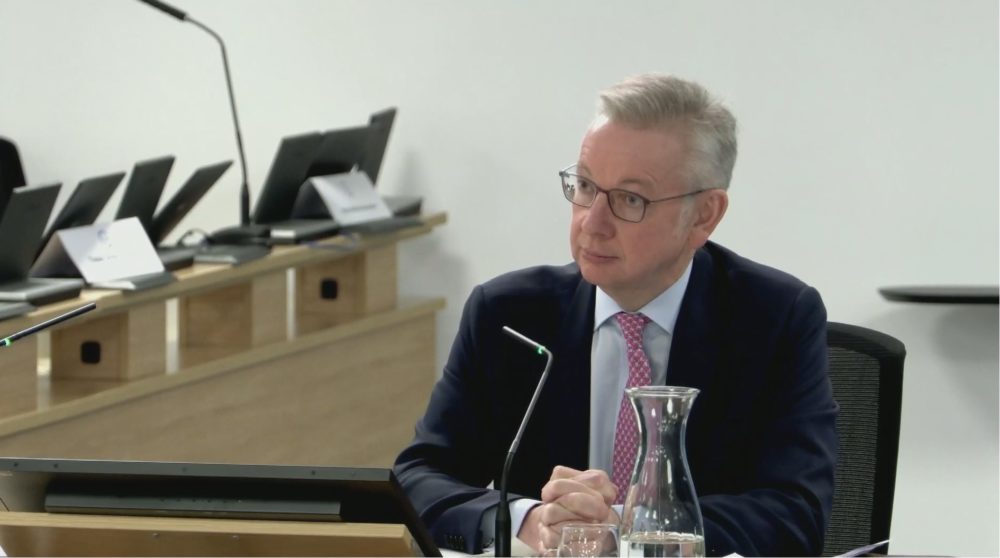Michael Gove apologises for UK Government’s ‘errors’ during pandemic

Michael Gove has apologised to victims and bereaved families for UK Government “errors” during the pandemic as he listed what he believed were the failings, including locking down too late.
But the senior Tory, who was Cabinet Office minister and chancellor of the Duchy of Lancaster when the pandemic began in 2020, also defended Boris Johnson’s “gladiatorial” decision-making and his No 10 against claims of dysfunctionality.
Giving evidence to the UK Covid-19 Inquiry on Tuesday, Mr Gove said he took some responsibility for the “mistakes” made at the top level of politics when the crisis unfolded and that he regretted not being more “forthright” in pushing for an earlier first lockdown.
Pain
He said: “If I may… apologise to the victims who endured such pain, the families who endured so much loss as a result of the mistakes that were made by Government in response to the pandemic.
“As a minister responsible for the Cabinet Office, and was also close to many of the decisions that were made, I must take my share of responsibility for that.”
Mr Gove said politicians are “human beings” who are “fallible” and “every decision was difficult and every course was bad” at the time.
While some mistakes were “unique and specific to the UK Government”, Mr Gove said “we need to remember that governments everywhere made errors”.
Asked later what the Government’s failures were, the Levelling Up Secretary gave a direct answer.
He said: “I believe that we were too slow to lockdown initially in March (2020). I believe we should have taken stricter measures before we eventually decided to do so in late October.”
Testing should have been more rigorously thought through, there was not enough focus on the impact on children and there were errors with the procurement of personal protective equipment, he added, noting that this was not an exhaustive list.
The UK was “certainly not well-enough prepared” for the unfolding pandemic in March 2020, he said.
Frustration
Mr Gove’s frustration at the time at the handling of the pandemic was clear in a WhatsApp message – shown to the inquiry – to Dominic Cummings on March 4.
“You know me, I don’t often kick off but we’re f****** up as a government and missing golden opportunities,” Mr Gove said in the exchange.
“I will carry on doing what I can but the whole situation is even worse than you think and action needs to be taken or we will regret it for a long time.”
Explaining the message to the inquiry, Mr Gove said he was concerned overall about the Cabinet Office, for which he had recently taken on responsibility, including its ability to deal with Covid.
The veteran Conservative accepted he “should definitely have been more forthright” in pushing for a lockdown at the beginning of March 2020.
He said Mr Johnson should not be singled out for criticism over the delay in imposing restrictions, noting that ministers and officials who did not voice their belief in the need for earlier action also “deserve our share, retrospectively, of criticism”.
The then-prime minister has been accused of dithering and failing to stick to decisions he had already made, at a time when the public health advice was pointing in the direction of a lockdown.
Mr Gove defended his old boss, who he said preferred “gladiatorial decision-making” with two or three options being weighed up.
Individual liberty
Mr Johnson’s “principled attachment to maximising individual liberty” meant it was “difficult for him to contemplate something like this”, Mr Gove also said.
The Cabinet minister also sought to play down accusations levelled repeatedly during the inquiry that Mr Johnson’s No 10 was mired in chaos, saying it was the nature of politics to have “strong personalities” with “strong views, sometimes punchily expressed”.
Mr Gove said he had a “high opinion” of former health secretary Matt Hancock, who faced repeated criticism from a number of witnesses before the inquiry.
Various witnesses have expressed concern about his performance as health secretary, with the inquiry hearing that the country’s most senior civil servant at the time, Lord Sedwill, wanted Mr Hancock to be sacked.
Mr Gove said “too much was asked” of Mr Hancock’s Department of Health and Social Care at the start of the pandemic and that other parts of Government should have taken on more.
The Levelling Up Secretary, who has held a number of prominent roles in Government, also told the inquiry that the Cabinet Office was “flawed” and not effective at dealing with crises.
“The Cabinet Office in and of itself, over many years, has operated in a way which is not as effective as it should be for the effective delivery of Government policy, both business as usual, and also in response to crises.”
The Surrey Heath MP at one point noted there was a significant body of judgment that believes Covid-19 was “man-made”, only to be told by Mr Keith the “divisive” issue was not part of the inquiry’s terms of reference.
Former deputy chief medical officer Professor Dame Jenny Harries will give evidence later on Tuesday.
Later this week, Lady Hallett’s probe will also take evidence from Mr Hancock and ex-deputy prime minister Dominic Raab.
The inquiry is taking evidence as part of its second module on core UK decision-making and political governance.
Support our Nation today
For the price of a cup of coffee a month you can help us create an independent, not-for-profit, national news service for the people of Wales, by the people of Wales.







Far rather hear a judge say “10 years no parole” to all of these politicos.
They were not errors. They were absolute shambles and incompetence foisted on the UK by Brexit. And Gove was in part an architect of the mess.
Sorry is the easiest word. 160,000+ dead and we get “Ooops! Soz!”